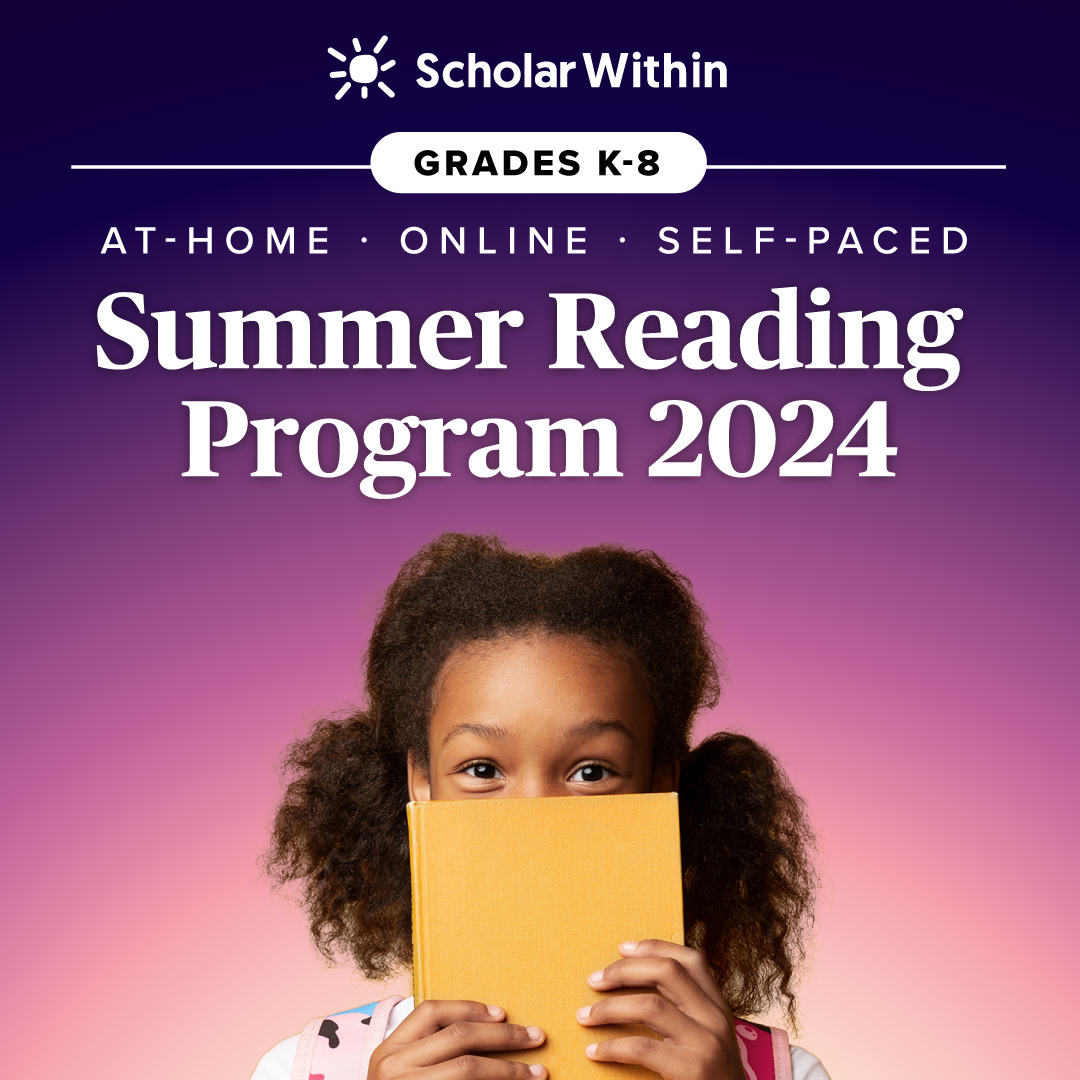Summer Reading Program 2024: Super Early Bird Special – Ends April 2nd at midnight. Sign Up
Flowers are blooming, days are getting longer and warmer, and summer is right around the corner. It might be time to start thinking about summer plans for your kids.
As much as we may think learning loss from COVID is over, many kids in grades 4th-8th are still behind. During this time, there has been a widening gap between students. High-income families were able to rely on private tutors during this time, whereas the rest of the students weren’t so lucky. (January 2024: The First Year of Pandemic Recovery: A District-Level Analysis)
The good news is that summer is the perfect time to help your kids improve their skills.
What Should a Summer Reading Program Include?
You might have heard the phrase lately known as The Science of Reading.
Well, what is The Science of Reading?
The Science of Reading is a systematic research-based way to teach all kids to read whether they have learning challenges or not. It is the most efficient way to teach kids how to read and to improve their reading skills. Unfortunately, not all teachers and school districts teach kids this way, but the good news is that you can make sure your kids learn these principles over the summer.
When you teach kids to read or improve their reading skills with The Science of Reading, you turn kids who HATE reading into kids who devour books and have newfound confidence.
So, what exactly is The Science of Reading composed of?
The Five Tenets of Reading (The Science of Reading):
What are each of these five tenets of reading?
- Phonemic Awareness is the ability to hear, identify, and manipulate the individual sounds – phonemes – in spoken words.
- Phonics uses the awareness of sounds and matches the sounds to the letter symbols.
- Fluency is the ability to retrieve words effortlessly.
- Vocabulary is the group of words you know and use effectively.
- Comprehension is the ability to understand, analyze, synthesize, and use what you have read.
Okay, great. I know what The Science of Reading is now, but what do I do with my kids over the summer?
Ahhh, the paradox of choice. What you choose will depend on your budget, time you have available, and how much you and your kids want to improve their skills.
- Hire a private tutor
Tutors can often cost an arm and a leg and can help with tailored one-on-one instruction. Depending on the tutor’s experience, they may or may not be experts at teaching reading and spelling with the science of reading. Unfortunately, they may turn out to be more expensive babysitters.
Cost: $40-150/hr - In-person or virtual 5-week classes
These programs meet once a week for an hour and a half for five weeks live or on Zoom. These programs cost $350+ and often don’t improve kids’ reading skills as much as parents would like.
Cost: $350+ per student - Library summer programs
These are great budget-friendly solutions. They often include a list of books for students to read and have meetings once a week or every other week. While there isn’t much focus on improving all the areas of reading (phonemic awareness, phonics, fluency, comprehension, and vocabulary), they do encourage kids to read, and something is better than nothing.
Most of the time, library programs figure out that kids already know how to read, but they don’t often help kids who hate reading or are struggling.
Cost: Free - Scholar Within’s Summer Reading Program
This program is rooted in the science of reading, plus it includes spelling and phonics video lessons, brain-body activities, executive function activities, card games, and more that get the whole family involved. This is a self-paced program that you can do at home on your schedule. A print material box (available separately) goes with the program’s online portion.
This program is perfect for kids who struggle with reading, hate reading, have dyslexia, auditory processing issues, or have other learning difficulties. It was designed by board-certified educational therapist Bonnie Terry, M.Ed., BCET.
This program does require some parent involvement. If you just want to sit your child in front of a computer, this is likely not the program for you. Grades K-3: Most of the activities are done together with the parent and child. Grades 4-8: A couple of activities are done with the parent and child together, and the rest the child can do independently.
Cost:$97$77 for 6 Weeks + $49 print material box (Limited time super early bird pricing)
A summer reading program can make the difference in your child’s future success. What if your child could make a 30% jump in their reading skills? What about 40 or 50%? With the right summer activities your child can drastically improve their skills and have a newfound confidence in the fall.
We might be biased, but we believe our summer program is the world’s best summer reading program for improving your kids reading skills over the summer.
- Kindergarten Summer Reading Program
- 1st-Grade Summer Reading Program
- 2nd-Grade Summer Reading Program
- 3rd-Grade Summer Reading Program
- 4th-Grade Summer Reading Program
- 5th-Grade Summer Reading Program
- 6th-Grade Summer Reading Program
- 7th-Grade Summer Reading Program
- 8th-Grade Summer Reading Program
Whether you choose Scholar Within’s program this summer or go another route, be sure to take the effort towards improving learning skills over the summer to prevent learning loss and to help build your child’s confidence when it comes to school.
Scholar Within’s Summer Reading Program Includes:
- Weekly Reading Selections
- Reading Comprehension Questions
- Reading Fluency Training Drills
- Phonics and Spelling Video Lessons
- Spelling Worksheets and Puzzles
- Note-Taking Printables
- Executive Function Activities
- Brain-Body Activities
- Card Games
- Daily Emails
- And More!
The program is a holistic approach to improving learning reading skills. By incorporating more than just the five tenets of reading, greater progress can be made.
What Parents Say About Scholar Within’s Summer Reading Program for Struggling Readers
Jennifer K. says:
“I started using this program after a TON of research. I needed a good fit for my 8 yr old dyslexic daughter. I’d say she 1.5-2 reading grades behind.
We tried the summer program and loved it.
This program was very simple and easy to acclimate to, which was a blessing bc these days I don’t have the time and energy to deep dive learning new programs. Scholar Within was instantly engaging and with the easy to follow step by step layout it made everything so approachable. I had to reach out through chat a few times and always received responses quickly and they were kind, helpful, and encouraging. 5 star customer service! I like how you can change the levels within the program (I started lower so that I could build her confidence) and the variety within lessons.
You might see that some are saying there’s a lot of printing, I was at first concerned about this but it really wasn’t bad. I’d just print a few lessons ahead of time and keep them in the folder. It was actually pretty easy and only took 1-2 minutes. They also have an option for some of the weeks to buy pre-printed materials. Do what works for you 🙂 My daughter said she really liked the games too.”
One component of the Summer Reading Program made a big difference for Brenda Prince. She says:
“I’ve been using the program with my ten-year-old special needs son who is reading below grade level and I can say that there has been a vast improvement as to his performance on each drill, both in his mastery of reading the words on the list as well as the number of words he reads each time. For example, his first attempt at Drill One which consists of Consonant-Vowel-Consonant words with the short a sound, he read eighteen words in the minute time frame but missed seven of those words. Over a period of three weeks, he was able to increase his speed to one hundred and eight words per minute and correctly pronouncing all of those words. When we moved on to subsequent drills, I noticed that he did much better, even on his first attempt at reading the word list.”
Janine Franks says:
“Thanks so much for the help you have given us. One of my sons was quite dyslexic in reading but after using your system, I rarely notice any sign of it. He actually enjoys reading now. He´s read Narnia on his own!”
Scholar Within and Bonnie Terry’s Summer Reading Program can be perfect for readers of all levels, whether they are at, above, or below reading proficiency for their grade level. It not only incorporates the five tenets of reading, but it focuses on improving the processes of how people learn. When your areas of visual, auditory, and tactile/kinesthetic perception are working as well as possible, it makes learning and reading easier for you.
This program also benefits those with dyslexia, ADHD, learning disabilities, or other reading struggles. It is specifically designed to help those that are either behind in reading, struggle with reading, or just want to boost their reading skills.
Learn more about the Summer Reading Program here.
Be sure to sign up for the program.

Who Is Bonnie Terry?
Bonnie Terry, M. Ed., BCET is the author of Five Minutes To Better Reading Skills, Ten Minutes To Better Study Skills and numerous other books, reading games, and guides. She is a Board Certified Educational Therapist and internationally recognized as America’s Leading Learning Specialist and the founder of BonnieTerryLearning.com. Terry is an expert in identifying students’ learning disabilities. Ms. Terry shows teachers and parents how can give their child a 2 to 4-year learning advantage in just 45-60 minutes a day. She is a frequent media guest and speaker.




